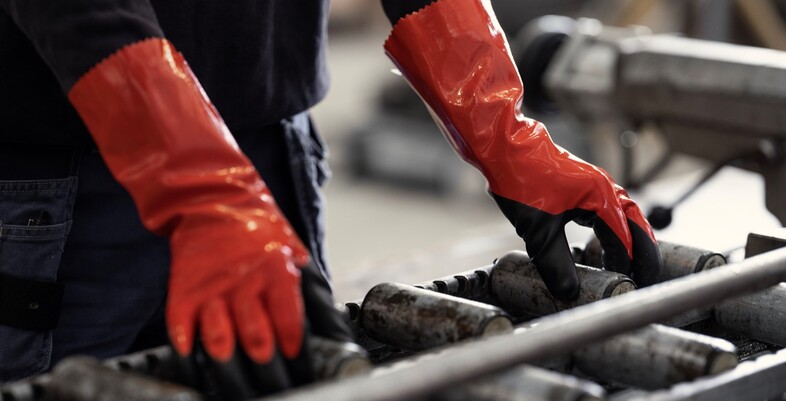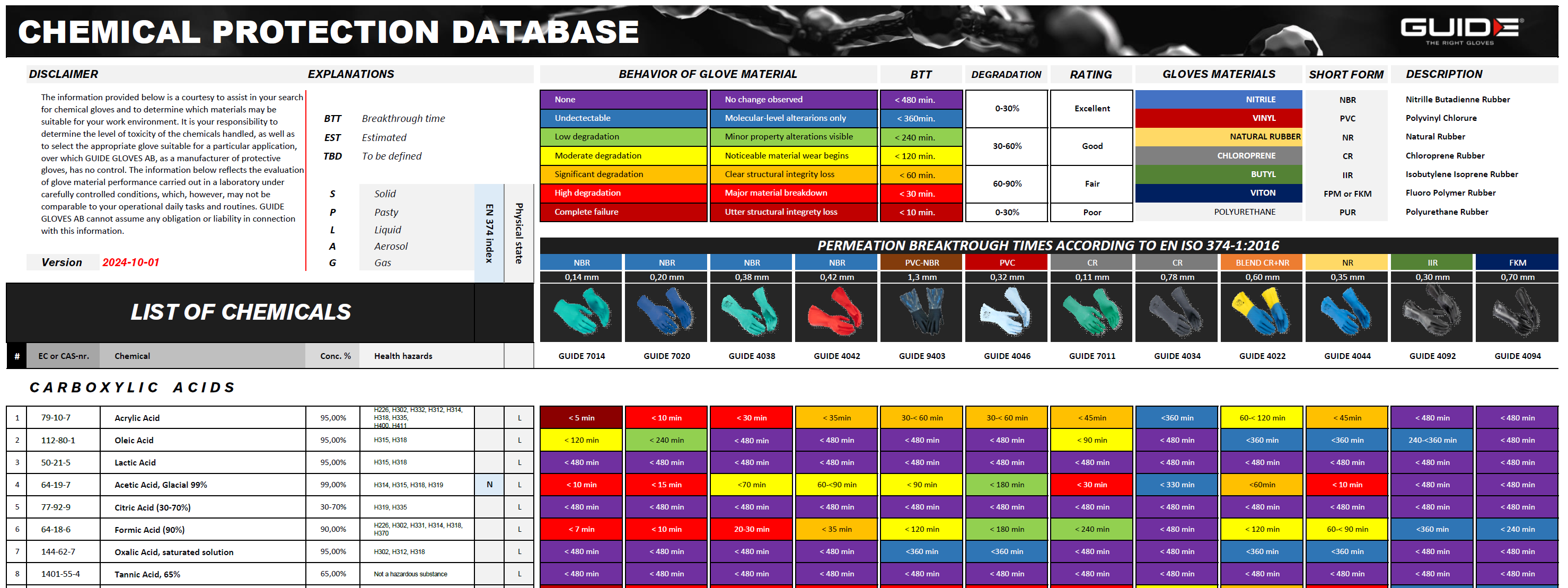
Protection against chemicals
Selecting the right chemical protection is crucial for safety.
Working with chemicals – whether in production, maintenance, cleaning, or other tasks – comes with serious risks.
Without adequate protection, chemical exposure can lead to health problems, including allergies, chronic illnesses, and neurological effects. To reduce these risks, it’s essential to choose chemical-resistant gloves tailored to your specific tasks.
Our range includes a variety of chemical-resistant gloves, each designed with unique properties to protect against different types of chemicals. Explore our full selection in our chemical catalog.
What is breakthrough time?
Breakthrough time refers to how long it takes for a chemical to penetrate the glove material at a molecular level, potentially reaching the skin even if the glove still appears intact. Understanding how a glove performs against the specific chemical you are handling is crucial to ensuring adequate protection for the duration of your exposure. Depending on the glove material and the chemical, permeation resistance can range from a full workday to just a few minutes.
- Differences between materials – Different materials, such as nitrile, latex, and PVC, have varying breakthrough times for the same chemicals. Choose the material best suited to the specific chemicals you handle.
- Strong chemicals – Some chemicals, especially those that are corrosive or highly concentrated, can quickly degrade materials and penetrate gloves. To handle such substances, you need a material with high resistance and a long breakthrough time, allowing the glove to effectively withstand the chemical throughout the work shift.
- Long exposure time – If your tasks require you to handle chemicals for extended periods without changing gloves, choose gloves with a long breakthrough time.
- Repeated exposure – If you reuse gloves with the same chemical, choose gloves with a high breakthrough time that can withstand repeated exposures.
- Degradation of material – When glove material breaks down over time, it’s called degradation. Exposure to chemicals, temperature, humidity, or UV light can accelerate this process, reducing the glove’s breakthrough time. Therefore, regularly check the condition of your gloves, whether new or used.
We know chemicals – So you can focus on your work!
We have documented the breakthrough times of our chemical-resistant gloves for a wide range of chemicals. Curious to find out which glove best suits your specific needs?
If you’d like to learn more or book an audit - contact one of our experts by filling out the form at the bottom of the page!
Other factors that affect your choice of chemical-resistant gloves
Beyond breakthrough time and degradation, other critical factors influence the selection of chemical protection gloves:
Glove Thickness – While thicker gloves are often associated with better protection against strong chemicals and prolonged exposure, this is not always the case. A glove’s actual performance depends on multiple factors, including material density, coating quality, and Acceptable Quality Level (AQL). A thicker glove with a lower AQL or less resistant coating may underperform compared to a thinner, well-designed alternative.
Mobility and Dexterity – For tasks requiring precision and frequent hand movements, a thinner, high-density chemical glove provides better control and efficiency. Disposable gloves, for example, offer flexibility and can be replaced frequently, ensuring continued protection. Prolonged use of any glove raises the question of its continued effectiveness, making regular replacement an essential part of safety protocols.
Glove Fit and Size – A properly fitting glove enhances both safety and performance. Oversized gloves reduce dexterity, while overly tight gloves may cause discomfort and increase the risk of tearing. Selecting the correct size ensures optimal protection and usability.
Work Environment – Environmental conditions such as temperature and humidity can impact glove durability and chemical resistance. High temperatures or moisture can accelerate material degradation, potentially compromising protection. Choosing the right glove material for specific conditions is crucial for maintaining safety.
By considering these factors, you can ensure that you have the right protection for your specific needs, creating a safe and efficient work environment.
Need help choosing the right chemical protection?
Fill out the form below, and we’ll get in touch with you!


